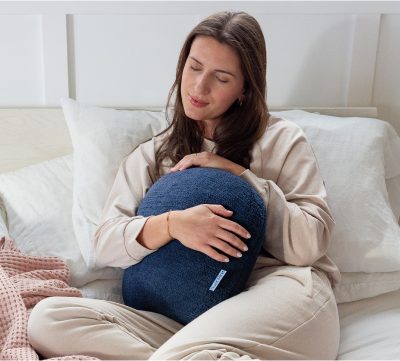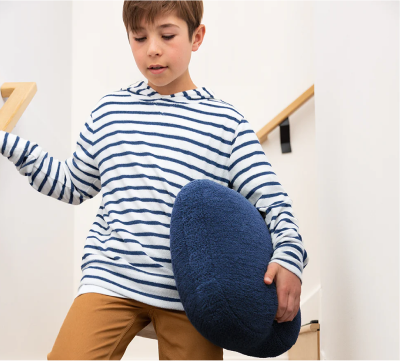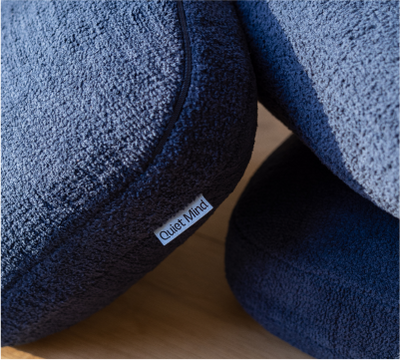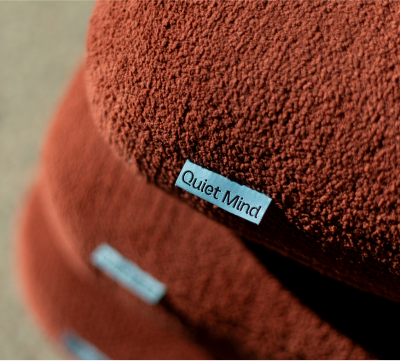You expect clarity. Energy. Focus.
But instead, the stimulant makes you tired.
For many people with Attention Deficit Hyperactivity Disorder (ADHD), stimulant medications don’t always feel stimulating. Instead of feeling energized or sharp, you might feel sleepy, sluggish, or emotionally flat.
This isn’t failure and you’re not alone. Fatigue after taking medications like Adderall or Ritalin can be a sign that your brain and nervous system are responding in unexpected ways.
If you’ve ever wondered why ADHD stimulants make you sleepy instead of energized, you're not imagining it. Understanding why this happens is key to making informed adjustments with your healthcare provider.
Let’s explore the science, lived experience, and steps you can take if your ADHD meds seem to drain your energy levels.
How Stimulant Medications Work in the ADHD Brain
To understand why stimulants might cause drowsiness, it helps to first understand how they work, especially in the ADHD brain.
Medications like Ritalin and Adderall increase dopamine and norepinephrine, two neurotransmitters responsible for motivation, attention, and task initiation. These chemicals help regulate what's often dysregulated in ADHD: the ability to focus, stay organized, and resist impulsive shifts in attention.
Dopamine Regulation and Focus Mechanisms
When dopamine levels rise:
- You experience improved focus and better task engagement.
- The brain becomes more selective about which stimuli to respond to.
- Hyperactivity and impulsivity may lessen due to more efficient self-regulation.
This dopamine-driven improvement in focus is a key reason stimulants are often used to manage ADHD. But brain chemistry is never one-size-fits-all. A response that energizes one person might overstimulate or deplete another, especially if the dose, timing, or other conditions aren’t quite right.
Why Stimulants Don’t Always Increase Energy
Despite the name, stimulants don’t simply boost energy levels like caffeine to counteract ADHD. Their effect is subtler, they enhance signal clarity in the brain's communication pathways.
But if your body is already tired, stressed, or out of rhythm, that clarity might feel like pressure instead of motivation.
Individual Response and Internal States
Everyone’s brain responds differently. You might be more sensitive to stimulants, or you might be dealing with:
- Sleep deprivation or chronic sleep disturbances.
- Anxiety or other coexisting health conditions.
- An ADHD subtype that leans more toward inattentive traits than hyperactive ones.
If your system is already depleted, even a standard dose can feel overwhelming. Instead of boosting focus, it might trigger a crash.
The Paradox of Feeling Tired After Taking Stimulants
Sometimes, what we call “tired” is actually cognitive fatigue. You might feel foggy or disconnected, not because the medication isn’t working, but because it’s demanding more mental output than your body can sustain.
Overstimulation vs. Rebound Fatigue
There are two common scenarios:
- Overstimulation: Your brain is pushed too hard, too fast. You feel wired, anxious, or emotionally blunted, and then crash.
- Rebound fatigue: As the stimulant wears off, the sudden dip in dopamine may cause a sharp drop in energy levels, leading to intense drowsiness or irritability.
|
Aspect |
Overstimulation |
Rebound Fatigue |
|
Cause |
Stimulant dose is too strong or fast-acting for your system |
Dopamine levels drop sharply as medication wears off |
|
Timing |
Occurs shortly after taking the medication |
Occurs as the effects of the medication fade |
|
Common Symptoms |
Feeling wired, jittery, anxious, emotionally flat, or hyper-focused to the point of discomfort |
Sudden drowsiness, brain fog, irritability, mood swings |
|
Physical Signs |
Increased heart rate, clenched jaw, restlessness |
Yawning, fatigue, low motivation, heavy limbs |
|
Emotional Impact |
May feel disconnected, overly serious, or unable to relax |
May feel emotionally drained, sensitive, or easily overwhelmed |
|
Behavioral Effects |
Difficulty switching tasks, possible social withdrawal due to tension |
Shutdown behavior, need to nap or isolate, irritability with demands |
|
What It Signals |
The dose or release profile may be too aggressive; timing might need to be split or lowered |
The medication may be wearing off too quickly; a booster dose or extended-release version may help |
|
What to Do |
Talk to your provider about lowering the dose or switching to a smoother-acting medication |
Discuss timing strategies, slow-release formulations, or mild afternoon support with your provider |
Both are signs that your current dosage, timing, or medication type may need adjustment.
How Mental Exhaustion Can Mimic Sleepiness
Not all tiredness is true drowsiness. For people with ADHD, the stimulant may boost mental clarity, but at a cost. You might find yourself able to focus, yet emotionally drained, physically heavy, or mentally foggy.
This is often a form of cognitive fatigue, not sleepiness in the traditional sense.
What it might feel like:
- A sense of “shutdown” after long periods of focus.
- Trouble transitioning between tasks or environments.
- Feeling flat or disconnected, even while getting things done.
This kind of exhaustion is your brain signaling it’s overworked; not that it needs sleep, but that it needs rest and nervous system regulation. Practices like relaxation techniques, breaks between tasks, or even non-stimulant coping strategies may help balance the stimulation-recovery cycle.
Common Reasons Stimulants Make People with ADHD Feel Sleepy
There’s no single cause. But understanding the most common contributors can help you troubleshoot with clarity.
Incorrect Dosage or Timing
- A dose too high can overstimulate, leading to a crash.
- A dose too low may not activate the brain enough, allowing fatigue to persist.
- Taking it too late in the day can disrupt natural sleep cycles and confuse your circadian rhythm.
Undiagnosed Sleep Disorders
Conditions like sleep apnea, restless leg syndrome, or delayed sleep phase disorder often coexist with ADHD.
- These can lead to unrefreshing sleep, even if you’re getting enough hours.
- Stimulants may then amplify underlying exhaustion, not relieve it.
Medication Tolerance or Sensitivity
- Some people build tolerance and find their usual dose less effective.
- Others are more sensitive, and even standard doses may tip them into fatigue or overstimulation.
Dopamine Dysregulation or Atypical Neurochemistry
- ADHD brains already have irregular dopamine signaling.
- If stimulants flood the brain too quickly or unevenly, it can result in mental shutdown rather than stimulation.
- This paradoxical fatigue is often due to overstimulation of dopamine receptors in certain brain regions, leading to temporary dysregulation.
Coexisting Anxiety or Emotional Blunting
- Stimulants can suppress emotional highs and lows in some people.
- This can create a sense of emotional numbness, lack of motivation, or feeling “flat,” which many people describe as tiredness.
- If underlying anxiety exists, the stimulant may initially reduce restlessness, but leave behind a drained or sedated feeling once the adrenaline subsides.
Poor Nutrition or Blood Sugar Fluctuations
- Stimulants often reduce appetite, leading to skipped meals or unbalanced eating.
- This can cause blood sugar drops, which mimic or amplify fatigue and shakiness.
- Nutrient depletion (e.g., B vitamins, magnesium) can also exacerbate stimulant side effects over time.
|
Potential Cause |
Description |
Possible Solution |
|
Incorrect Dosage or Timing |
Overstimulation or poor alignment with circadian rhythm |
Adjust dose or timing with your provider |
|
Undiagnosed Sleep Disorders |
Sleep issues (e.g., apnea, RLS) masking as medication side effects |
Explore sleep studies or evaluations |
|
Medication Tolerance/Sensitivity |
Reduced efficacy or paradoxical fatigue from standard doses |
Try alternative stimulants or titrate dosage with medical guidance |
|
Dopamine Dysregulation |
Unbalanced dopamine activity can trigger shutdown instead of focus |
Monitor how your body responds; consider switching formulations |
|
Emotional Blunting or Anxiety |
Medication dulls emotions or post-anxiety fatigue creates crash-like sensation |
Discuss non-stimulant options or supportive therapy with provider |
|
Poor Nutrition or Blood Sugar Fluctuations |
Stimulants suppress appetite leads to energy crashes |
Eat a protein-rich breakfast and maintain stable meals/snacks |
ADHD, Fatigue, and the Role of Sleep Deprivation
Sleep is a foundational need and many adults with ADHD struggle to meet it consistently. The brain’s internal clock is often misaligned, and sleep routines can feel elusive.
Poor Sleep Hygiene in Adults with ADHD
Sleep hygiene refers to the daily habits and environmental factors that support healthy, restorative sleep. Unfortunately, adults with ADHD often struggle with maintaining consistent routines, especially at night.
These disruptions aren’t just side effects of modern life; they’re deeply tied to ADHD traits like impulsivity, hyperfocus, and time blindness.
Common patterns that contribute to poor sleep hygiene include:
- Irregular bedtimes
- Difficulty winding down after evening stimulation
- Screen use late into the night
- Overuse of caffeine or sugar to compensate for fatigue
These patterns lead to sleep disturbances that make it harder for stimulants to work as intended.
How Sleep Deficits Interact with Medications
When your body is already running on empty:
- Stimulants can feel more like pressure than support.
- Emotional regulation may worsen.
- You may experience the “tired but wired” sensation; unable to rest, yet too drained to function.
Supporting your sleep hygiene through structure, wind-down rituals, or calming tools like a scented weighted pillow can help reduce this loop. As a result, it can improve how your brain responds to medication.
How Long Does Stimulant-Induced Sleepiness Last?
The duration of fatigue after taking medications like Adderall or Ritalin depends on multiple factors, including:
- The type of stimulant (short-acting vs. extended-release).
- Your energy levels before dosing.
- How well your sleep, nutrition, and nervous system are regulated.
- Whether you're taking other medications or managing coexisting health conditions.
Medication Duration and Metabolism
- Short-acting stimulants tend to wear off within 3–6 hours.
- Extended-release formulations may last 8–12 hours.
But it's not just about how long the medication is active, it’s about how your body metabolizes and recovers from the stimulation. Some people experience what’s known as the “crash” period, when energy sharply drops as the medication fades. Others may feel low-level fatigue throughout the day if their nervous system is overwhelmed.
Can You Be Tired but More Focused on Stimulants?
Yes, and this paradox is surprisingly common for adults dealing with ADHD.
The Complex Relationship Between Fatigue and Focus
Stimulants can increase dopamine and norepinephrine, improving task engagement, emotional regulation, and cognitive control. You may find yourself able to:
- Read longer without distraction
- Sit through meetings more easily
- Plan and prioritize tasks clearly
But alongside that improved focus, your energy levels might still feel depleted. High-functioning ADHD people may appear productive and organized on the outside, yet still struggle with internal fatigue and emotional exhaustion. This “alert but tired” state reflects how mental effort and dopamine shifts affect the ADHD brain.
Some people describe this as being “on autopilot”: tasks get done, but there's little sense of vitality or joy. That’s why integrating cognitive-behavioral therapy or non-stimulant coping strategies can be vital, not just to reduce hyperactivity, but to support emotional and physical well-being.
Can Stimulants Cause Fatigue in People Without ADHD?
Yes. In people who don’t have attention deficit hyperactivity disorder, stimulant medications can actually cause:
- Anxiety
- Restlessness
- Crash fatigue
- Disrupted sleep or irritability
Differential Effects on Neurotypical vs. ADHD Brains
Stimulants affect ADHD and neurotypical brains differently, what enhances function in one may cause imbalance in the other.
|
Brain Type |
Effect of Stimulants |
Typical Outcome |
|
ADHD Brain |
Supports dopamine regulation and executive function |
Improved focus, reduced impulsivity |
|
Neurotypical Brain |
Can overstimulate the reward system or emotional centers |
May trigger anxiety, fatigue, or flat affect |
This difference is why medications like Ritalin or Adderall should never be used casually or without the oversight of a trained healthcare provider. What balances one person’s brain may dysregulate another’s.
What to Do If Your ADHD Medication Makes You Sleepy
Sleepiness isn’t failure, it’s feedback. And with the right adjustments, it can often be resolved.
When to Talk to Your Doctor About Side Effects
If you're consistently feeling sleepy after taking your ADHD medication, don’t brush it off. Open communication with your healthcare provider is essential. Prepare to share specific details, such as:
- Your current dosage and timing (e.g., what time you take your medication and how long the effects last).
- Patterns in your energy and mood throughout the day. Are you crashing in the afternoon? Do you feel mentally clear but physically fatigued?
- Your sleep habits and overall sleep quality. Even with a full night’s rest, are you waking up tired?
- Other symptoms, such as increased anxiety, irritability, or emotional flatness.
Your provider may ask you to keep a medication journal; a daily log of how you feel after taking your stimulant, when you notice changes, and any external stressors or sleep disturbances.
Some people find that pairing their treatment plan with structured self-regulation strategies or low-stimulation tools can help their system handle the medication more smoothly. These approaches often include mindfulness techniques, physical movement, or calming routines that support focus without relying solely on pharmaceuticals.
Exploring Adjustments: Timing, Dose, or Type of Stimulant
Small modifications can often make a significant difference in how your medication affects you. Some common adjustments your doctor may suggest include:
- Shifting your medication to an earlier time of day, especially if drowsiness hits during peak activity hours or interferes with your evening routine.
- Splitting the dose (if approved), allowing a more gradual release of the stimulant and avoiding harsh energy spikes and drops.
- Trying a different stimulant formulation, such as moving from short-acting to extended-release, or even exploring non-stimulant medications that may offer similar benefits with fewer side effects.
This is a trial-and-error process, and what works for one person may not work for another. But with patience and partnership, it's absolutely possible to find a treatment approach that supports focus without leaving you drained.
Real Experiences: What Other Adults with ADHD Say
You’re not alone in this. Many adults with ADHD report experiencing fatigue or brain fog shortly after taking their medication, even as their ability to concentrate improves. Some common stories include:
- Feeling more productive but deeply tired during the day, as if the medication supports focus but drains emotional or physical energy.
- A sharp drop in motivation or alertness a few hours after dosing, known as a stimulant "crash."
- Finding real relief only after adjusting the type, dosage, or timing of their medication.
These shared experiences highlight something important: sleepiness doesn’t mean failure, it means your brain and body are asking for a better fit. Whether that means a tweak in your dosage or a shift to non-stimulant strategies, your experience is valid, and there is a path forward.
Final Thoughts: Honoring Your Body’s Signals
If stimulants make you sleepy, your body isn’t betraying you, it’s speaking to you.
ADHD treatment is not one-size-fits-all, and medication is just one part of the puzzle. Sleepiness, fatigue, or emotional flatness are signals that something in your current routine may need adjusting.
That might mean exploring a different dose, switching to a non-stimulant option, or giving more care to your sleep hygiene and daily rhythm.
The goal isn’t just to improve focus, it’s to feel regulated, supported, and whole. With patience, partnership with your healthcare provider, and a willingness to listen inward, you can find a balance that works for your ADHD brain.
You’re not alone. And there’s always a path forward.
About Quiet Mind
Quiet Mind offers gentle, practical tools for people navigating ADHD, stress, and sensory overload. Our goal is to create calm, supportive resources that reflect real-life challenges, like shifting energy levels, difficulty sleeping, or managing overstimulation.
The Quiet Mind Weighted Pillow was developed to provide a simple, comforting form of pressure support. Many people use it while working, resting, or transitioning between tasks to help reduce hyperactivity and support emotional regulation.
Whether you're using stimulant medication or managing fatigue naturally, weighted tools may offer a small but meaningful way to ground your nervous system throughout the day.
Frequently Asked Questions
Why do stimulants like Adderall make me feel sleepy when I have ADHD?
It could be due to overstimulation, rebound fatigue, or underlying sleep issues. Some individuals with ADHD experience paradoxical sedation in response to stimulant medication.
Can incorrect dosage or timing of ADHD medication cause sleepiness?
Yes. Taking too much or taking it at the wrong time of day can lead to fatigue or disrupt natural energy cycles.
How do sleep disorders affect the way stimulants work for ADHD?
Sleep disorders like apnea or insomnia can dull stimulant effects and cause daytime drowsiness, even when medicated.
Is it common for people with ADHD to experience fatigue while taking stimulants?
Yes. Many adults report fatigue as a side effect, especially if dosage or sleep hygiene needs adjustment.
Can stimulants cause fatigue in people without ADHD?
They can. In non-ADHD brains, stimulants may overstimulate or unbalance neurotransmitters, sometimes resulting in fatigue or anxiety.
Can lifestyle changes help manage ADHD symptoms and reduce sleepiness?
Absolutely. Regular movement, mindful rest, and consistent sleep hygiene can all help support better energy regulation.
















